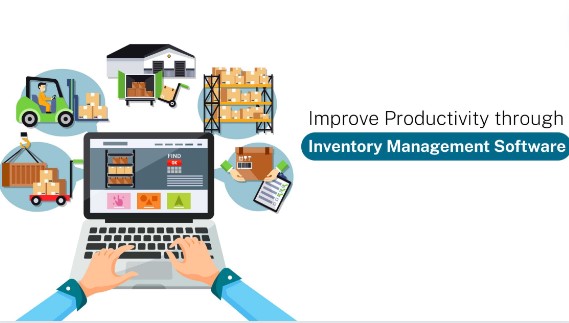
Inventory Management Software - Key Features and Benefits
Pratik Lohiya |
26 Feb 2024 |
16:58 PM
- What is inventory management?
- Main types of inventory
- Understanding Inventory Management Software
- Key Features of Inventory Management Software
- Choosing the Right Inventory Management Software
- Benefits of Inventory Management Software
- Top Benefits of Implementing Inventory Management Software
- Conclusion
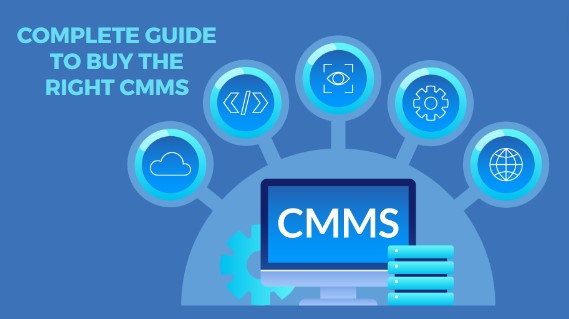
Complete guide to buy the right CMMS
Viki Dongare 13 Feb 2024 | 17:44 PMDiscover how to select the perfect Computerized Maintenance Management System (CMMS) for your organization and optimize maintenance operations effectively...
Inventory management is the systematic process of overseeing and controlling the flow of goods and materials within a business's operations. It involves optimizing stock levels to ensure sufficient stock is available to meet customer demand while minimizing excess or obsolete inventory.
What is inventory management?
Inventory management encompasses various activities, including inventory tracking, ordering, storing, and analyzing stock levels. It aims to strike a balance between ensuring products are readily available for customers while avoiding overstocking, which ties up capital and storage space.
Main types of inventory
There are several types of inventory that businesses manage, including raw materials, work-in-progress (WIP), finished goods, and maintenance, repair, and operations (MRO) inventory. Each type requires specific management strategies to optimize efficiency and reduce costs.
Stages of inventory management
The stages of inventory management typically include forecasting demand, setting reorder points, placing orders with suppliers, receiving and inspecting incoming inventory, storing inventory in appropriate locations, and tracking inventory movements throughout the supply chain.
Inventory management challenges
Despite its importance, inventory management poses various challenges for businesses, such as demand forecasting inaccuracies, stockouts, overstocking, inventory shrinkage, and managing multiple inventory locations. Effective inventory management software can help address these challenges by providing real-time visibility into inventory levels and automating key processes.
Understanding Inventory Management Software
What is inventory management software?
Inventory management software is a specialized tool designed to help businesses efficiently manage their inventory-related tasks. It automates and streamlines inventory processes, such as tracking stock levels, managing orders, and optimizing inventory levels.
How does inventory management software work?
Inventory management software works by centralizing all inventory-related information into a single digital platform. It typically includes features such as barcode scanning, real-time inventory tracking, order management, and reporting capabilities.
When a business receives new inventory, the software updates the inventory database accordingly, recording details such as quantity received, location, and supplier information. As products are sold or used, the software automatically adjusts stock levels to reflect the changes.

Inventory management software also helps businesses forecast demand, set reorder points, and generate purchase orders to replenish stock when inventory levels fall below a certain threshold. Additionally, it can provide valuable insights through reporting and analytics, allowing businesses to make data-driven decisions to optimize their inventory management processes.
Overall, inventory management software plays a crucial role in improving efficiency, reducing costs, and enhancing accuracy in managing inventory operations.
Key Features of Inventory Management Software
Inventory management software features comes equipped with a range of features to streamline and enhance inventory management process. Here are some key features commonly found in inventory management software:
Reporting and analytics
Inventory management software provides robust reporting and analytics capabilities, allowing businesses to gain insights into their inventory performance. Users can generate various reports, such as inventory levels, stock movements, sales trends, and supplier performance, to make informed decisions and identify areas for improvement.
Sales management
Effective inventory management software includes sales management features to track sales orders, monitor sales performance, and manage customer transactions. It streamlines the sales process by automating order processing, invoicing, and payment tracking, ensuring timely fulfillment of customer orders.
Production management

For businesses involved in manufacturing, inventory management software system offers production management functionalities. These features enable users to plan production schedules, manage bill of materials (BOM), track work-in-progress (WIP), and coordinate with suppliers to ensure timely delivery of raw materials.
Customer and supplier management
Inventory management systems facilitate efficient customer and supplier management by maintaining comprehensive databases of customer and supplier information. It allows businesses and ecommerce platforms to track customer orders, manage supplier relationships, and communicate effectively with both parties to fulfill orders and manage inventory replenishment.
Inventory planning and optimization
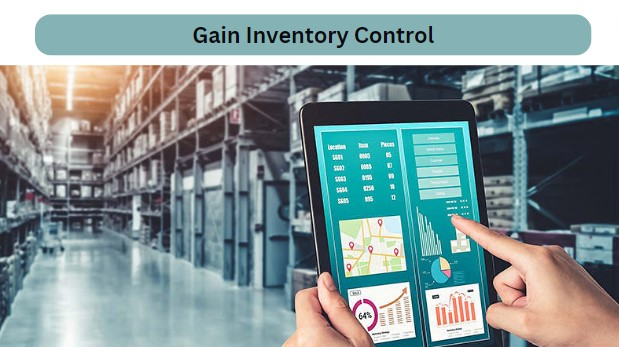
One of the primary functions of inventory management software is to optimize stock levels and prevent stockouts or overstocking. Advanced algorithms and forecasting tools help businesses forecast demand, set optimal reorder points, and receive low stock alerts to ensure adequate inventory levels while minimizing carrying costs.
Inventory control and replenishment
Inventory software features provide robust inventory control and replenishment features to maintain accurate stock levels. It includes functionalities such as barcode scanning, serial number tracking, lot tracking, and automatic reorder triggers to streamline inventory management processes and prevent stockouts.
These key features of inventory management software empower businesses to efficiently manage their inventory, improve operational efficiency, and meet customer demands effectively.
Choosing the Right Inventory Management Software
Selecting the appropriate inventory management software system is crucial for businesses to streamline their operations and maximize efficiency. Here are key considerations for manufacturers and retailers when choosing inventory management software:
What should manufacturers look for in inventory management software?
-
Production Management Features: Manufacturers need inventory management systems that offers robust production management capabilities. Look for features such as bill of materials (BOM) management, work-in-progress (WIP) tracking, and production scheduling to optimize manufacturing processes.
-
Supply Chain Integration: Manufacturers operate within complex supply chains, so it's essential to choose software that seamlessly integrates with suppliers and distributors. Look for software that supports electronic data interchange (EDI) and facilitates communication with suppliers for efficient procurement and delivery of raw materials.
-
Quality Control: Quality control is paramount in manufacturing. Seek inventory management system that includes quality control features to track product defects, manage returns, and ensure compliance with industry regulations and standards.
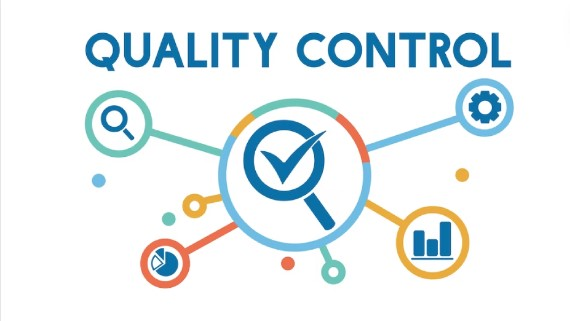
-
Scalability: As manufacturing operations grow, the inventory system should be able to scale with the business. Look for flexible and scalable solutions that can accommodate increasing inventory volumes and evolving business needs without significant disruption.
What should retailers look for in inventory management software?
-
Multi-channel Sales Support: Retailers operate across various sales channels, including brick-and-mortar stores, e-commerce platforms, and mobile apps. Choose inventory management system that supports multi-channel sales to synchronize inventory levels and sales data across all channels.
-
Point of Sale (POS) Integration: Integration with POS systems is essential for retailers to streamline sales transactions and inventory management system. Look for an inventory software that seamlessly integrates with POS systems to track sales in real-time, gives inventory alerts, update inventory levels, and generate accurate sales reports.
-
Inventory Visibility: Retailers need real-time visibility into inventory levels across multiple locations to prevent stockouts and optimize inventory allocation. Choose software that provides comprehensive inventory visibility, including stock levels, location tracking, and stock movements.
-
Demand Forecasting: Accurate demand forecasting is critical for retailers meet customer expectations\ and optimize inventory levels. Look for inventory management software features that offers advanced forecasting algorithms and analytics to predict demand trends and optimize inventory planning.
By considering these factors, manufacturers and retailers can select the right inventory management system to streamline their operations, improve efficiency, and meet customer demands effectively.
Benefits of Inventory Management Software
Inventory Accuracy and Efficiencies -One of the primary benefits of inventory management software is improved accuracy and efficiency in inventory management processes. By automating tasks such as inventory tracking, ordering, and stock reconciliation, businesses can minimize human errors and ensure accurate inventory records. This leads to better inventory accuracy, reduced instances of stockouts or overstocking, and optimized inventory levels.
Cutting Costs Across the Board - Effective inventory management software helps businesses cut costs in several areas. By optimizing inventory levels and reducing excess stock, businesses can minimize carrying costs associated with storage, insurance, and obsolescence. Additionally, streamlined processes and reduced manual intervention result in lower labor costs and increased operational efficiency, ultimately leading to cost savings across the board.
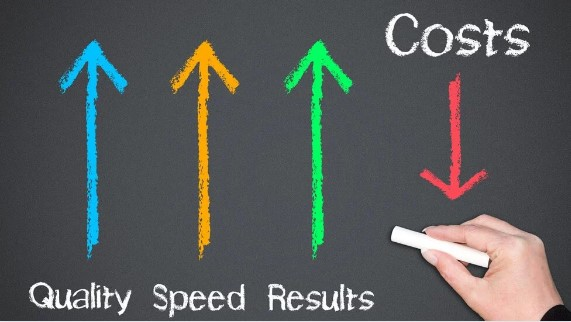
Improved Data Visibility and Planning - Inventory management software provides businesses with enhanced visibility into their inventory data. Real-time access to inventory levels, sales data, and supplier information enables better decision-making and strategic planning. Businesses can identify trends, forecast demand more accurately, and adjust inventory levels accordingly, leading to improved inventory planning and optimization.
Preventing Excess Stock and Stock-Outs - Great inventory management system helps businesses prevent both excess stock and stockouts. By setting optimal reorder points and safety stock levels, businesses can ensure that they have enough inventory on hand to meet customer demand without overstocking. Simultaneously, real-time inventory tracking and automated alerts enable businesses to proactively address stockouts and replenish inventory in a timely manner, thereby improving customer satisfaction.
Better Customer Service - With inventory management software, businesses can provide better customer service by ensuring product availability and timely order fulfillment. By accurately tracking inventory levels and streamlining order processing, businesses can fulfill customer orders promptly, reduce order processing times, and minimize backorders or delays, resulting in improved customer satisfaction and loyalty.
Coordinating Multiple Locations - For businesses with multiple locations or warehouses, inventory management software facilitates seamless coordination and synchronization of inventory across all locations. Centralized inventory control and real-time data visibility enable businesses to optimize inventory allocation, transfer stock between locations efficiently, and maintain consistent inventory levels across the entire supply chain.
Automate Time-Consuming Manual Tasks - Inventory management software features that automates time-consuming manual tasks, such as data entry, inventory tracking, and order processing, freeing up valuable time for employees to focus on more strategic activities. By automating repetitive tasks, businesses can improve productivity, reduce errors, and allocate resources more effectively, ultimately driving business processes and profitability.
Top Benefits of Implementing Inventory Management Software
Higher Productivity - Inventory management software streamlines processes, automates tasks, and provides real-time insights, leading to higher productivity. By eliminating manual data entry and reducing time spent on inventory-related activities, employees can focus on more strategic tasks, ultimately boosting overall productivity levels within the organization.

Better Profitability - Effective inventory management software helps businesses optimize inventory levels, reduce carrying costs, and minimize stockouts, resulting in better profitability. By accurately forecasting demand, businesses can avoid overstocking, which ties up capital, and prevent stockouts, which can lead to lost sales opportunities. Ultimately, improved inventory management contributes to healthier profit margins and overall financial performance.
Easy Inventory Processing - Inventory management software simplifies inventory processing by automating repetitive tasks such as data entry, order processing, and inventory tracking. With intuitive user interfaces and streamlined workflows, businesses can process inventory transactions more efficiently, reducing errors and improving overall accuracy.
Reduces Aged Inventory and Deadstock - By providing visibility into inventory levels and demand trends, inventory management software helps businesses identify slow-moving or obsolete inventory (aged inventory) and take proactive measures to address it. With better inventory control and optimization, businesses can minimize deadstock, reduce inventory write-offs, and maximize inventory turnover rates.
Automate Manual Inventory Tasks - Inventory management software automates manual inventory tasks such as stock reconciliation, order processing, and reporting, saving time and reducing errors. By leveraging automation, businesses can improve accuracy, streamline operations, and increase efficiency in managing their inventory processes.
Better Customer Service - Accurate inventory management ensures that businesses can fulfill customer orders promptly and maintain optimal stock levels to meet customer demand. By preventing stockouts and backorders, businesses can enhance customer satisfaction and loyalty, leading to repeat business and positive word-of-mouth referrals.

Lessens the Chance of Stock-Outs - Inventory management software helps businesses maintain optimal inventory levels and prevent stockouts by setting reorder points, safety stock levels, and automated replenishment triggers. By ensuring that products are always available when customers need them, businesses can avoid lost sales opportunities and maintain customer satisfaction.
Accurate Expense Tracking - With inventory management software, businesses can accurately track expenses related to inventory, including purchasing costs, carrying costs, and holding costs. By gaining insights into inventory-related expenses, businesses can make informed decisions to optimize spending and improve overall cost management.
Conclusion
In today's dynamic business landscape, efficient inventory management is essential for success. Businesses across industries are increasingly turning to inventory management software to streamline their operations, enhance productivity, and boost profitability. Through this comprehensive guide, we have explored the various aspects of inventory management software, including its key features, benefits, and considerations for selection.
Inventory management software serves as a powerful tool for businesses to optimize their inventory processes, from tracking stock levels to managing orders and suppliers. By centralizing inventory data and automating repetitive tasks, businesses can improve accuracy, reduce errors, and free up valuable time for strategic decision-making.
One of the primary advantages of inventory management software is its ability to improve inventory accuracy and efficiencies. By providing real-time visibility into inventory levels and automating inventory-related tasks, businesses can minimize stockouts, prevent overstocking, and optimize inventory levels to meet customer demand effectively.
Moreover, implementing inventory management software offers significant cost-saving opportunities. By optimizing inventory levels, businesses can reduce carrying costs associated with storage, minimize losses from obsolete or aged inventory, and improve overall operational efficiency, leading to better profitability.
Another key benefit of inventory management solution is its role in enhancing customer service. By ensuring product availability, minimizing backorders, and streamlining order processing, businesses can deliver exceptional customer experiences, leading to increased customer satisfaction and loyalty.
Furthermore, inventory management features enables businesses to coordinate multiple locations seamlessly. With centralized inventory control and real-time data visibility, businesses can optimize inventory allocation, transfer stock between locations efficiently, and maintain consistent inventory levels across the entire supply chain.
Additionally, inventory management features helps businesses automate time-consuming manual tasks, such as data entry, order processing, and inventory tracking. By leveraging automation, businesses can improve productivity, reduce errors, and allocate resources more effectively, ultimately driving business growth and profitability.
The software offers a wide range of benefits for businesses, including increased productivity, improved profitability, streamlined inventory processing, enhanced customer service, prevention of stockouts, and accurate expense tracking. By leveraging these benefits, businesses can achieve greater efficiency, profitability, and competitiveness in today's fast-paced business environment.
As businesses continue to adapt to evolving market trends and customer demands, investing in robust inventory management software is essential for staying ahead of the competition and maximizing success in the long term. With the right inventory management software in place, businesses can unlock their full potential, minimize risks, and thrive in today's competitive marketplace.